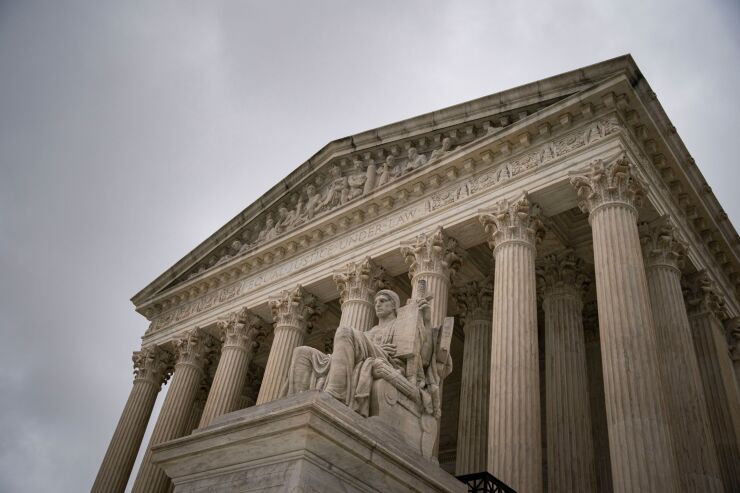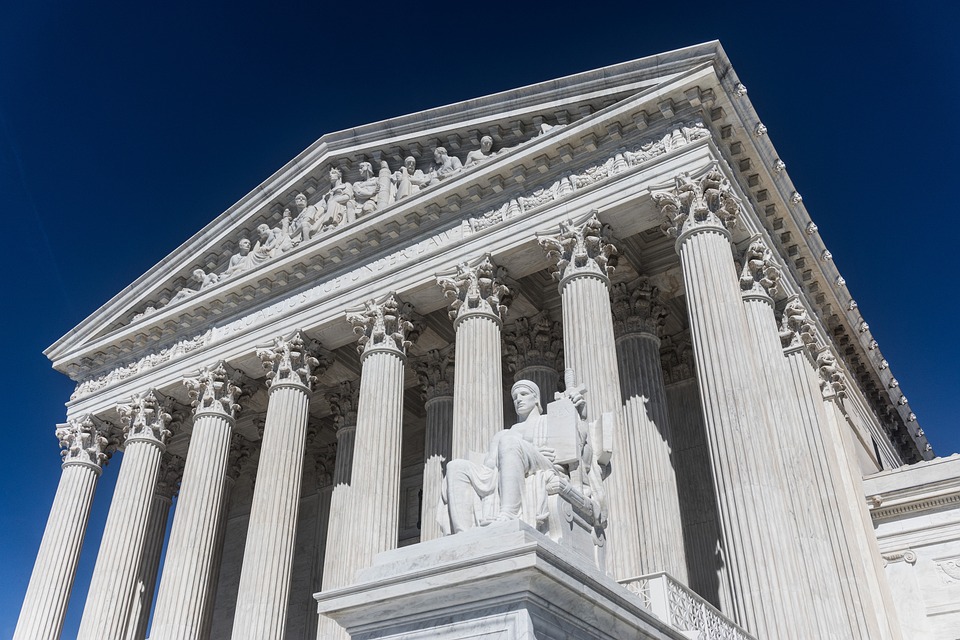
Bloomberg Creative
The Supreme Court is predicted to rule by the conclusion of June on whether or not or not the funding framework for the Shopper Fiscal Safety Bureau is constitutional. If the courtroom sides with payday collectors that sued the CFPB proclaiming its funding is unconstitutional, there can be huge fallout for different organizations, collectively with the Federal Reserve, the Office of the Comptroller of the Forex and the Federal Deposit Insurance coverage Corp.
But fairly a number of lawful specialists suppose the big courtroom docket is extra very more likely to rule in favor of the CFPB based on oral arguments heard in October when solely only one justice — Affiliate Justice Sonia Sotomayor — questioned what remedy there should be if the company’s funding by the Federal Reserve Process is noticed to be unconstitutional.
Since the justices unsuccessful to dedicate considerably time to a remedy — and in its place had been remarkably skeptical that Congress improperly funded the bureau — a number of monetary firms sector attorneys are actually gaming out what’s going to materialize to many pointers and lawsuits which have been on maintain pending the outcome of the scenario, Buyer Money Protection Bureau v. Neighborhood Financial Services Association of The us.
“I depend on the CFPB to win,” acknowledged Alan Kaplinsky, senior counsel at Ballard Spahr, who expects the ruling has taken so intensive to decide as a result of of to interrupt up selections by the justices. “There will likely be a number of viewpoints and dissenting ideas and presumably concurring ideas, and it takes time to get all that carried out.”
Quite a number of authorized professionals who submitted amicus briefs on behalf of CFSA, the lead commerce workforce for payday lenders that sued the CFPB in 2018, don’t think about the payday mortgage suppliers will acquire, Kaplinsky stated. The common see has been that Solicitor General Elizabeth Prologar, representing the CFPB, launched a stronger scenario than her counterpart, Noel J. Francisco, a former solicitor fundamental representing the payday groups, who struggled by oral arguments to affect a overwhelming majority of the justices that Congress skilled inappropriately delegated its authority to the CFPB.
“They did not request the bureau or each social gathering, how can we repair this? What is the choice?” reported AJ Dhaliwal, a companion on the regulation company Sheppard Mullin. “Since they didn’t get into that, they can’t blow [the CFPB] up.”
Michael Benoit, chairman of the laws firm Hudson Prepare dinner LLP, acknowledged that if the Supreme Court sided with payday mortgage suppliers, the impression on federal financial regulators can be enormous.
“I’ve by no means ever felt the funding argument was extremely potent,” Benoit stated, incorporating that while the Supreme Court docket just isn’t meant to be political, “a remaining choice that invalidates decades-extensive funding mechanisms can be a political earthquake in an election calendar yr — primarily this election yr.”
Quite a number of authorized specialists at first thought-about all of the CFPB’s earlier pointers and steps can be threatened when a three-choose panel of the U.S. Court docket of Appeals for the fifth Circuit vacated the payday lending rule in 2022 and located that the CFPB’s funding exterior the home the congressional appropriations system violates the Constitution’s separation of powers. Considering that then, difficulties to the CFPB’s funding have been half of just about every particular person lawful transient in litigation submitted in the direction of the company indirectly, kind or type, attorneys reported.
But provided that the oral arguments had been held in October, there was a reversal. Authorized specialists consider a flood of litigation will likely be unleashed following the Supreme Court guidelines within the CFPB’s favor.
“It will likely be a flurry of exercise,” Kaplinsky stated.
Past calendar yr the CFPB launched into a deciding on spree in only one of the most important recruitment drives on the firm in anticipation of litigation going ahead.
3 major pointers presently on preserve will go ahead, just like the payday lending rule, the smaller enterprise enterprise details assortment rule and a contentious anti-discrimination plan.
“There is definitely a lull proper now earlier than the choice,” Dhaliwal defined. “The drop was extraordinarily occupied and contemplating the truth that the New Year, it’s gotten true quiet in side as a result of reality of the Supreme Courtroom choice that is more likely to arrive out.”
In the meantime, 9 enforcement steps and 5 petitions to implement civil investigative requires have been stayed pending the result of the CFSA circumstance, in accordance to the CFPB.
“The CFPB is searching ahead to the Court’s choice, and within the meantime, we’ve got continued to hold out the very important consumer security function that Congress has charged us to conduct,” a CFPB spokesperson claimed.
Among the the insurance policies which are on maintain, the payday rule is the best living proof of how an firm rule will be locked in litigation for a number of years.
Initially formulated and finalized in 2017 by earlier CFPB Director Richard Cordray, the payday rule was stripped of a provision requiring that lenders set up a debtors’ means to repay a mortgage, and its preliminary 2018 compliance day was postponed by a Texas select proper after commerce groups sued the bureau. What continues to be, if the rule will get enacted quickly after the Supreme Court circumstance, is a restriction that bars payday lenders from incomes rather more than two unsuccessful makes an attempt to debit fee for a payday private mortgage from a shopper’s checking account. The limits have been made to defend debtors from having their assets garnished by mortgage suppliers and from incurring repeat overdraft charges.
Meanwhile, the tiny-enterprise particulars assortment rule — generally known as 1071 for its section within the Dodd-Frank Act — would want that banking establishments, credit score rating unions and little-business enterprise mortgage firms acquire and report particulars on apps for credit score rating, largely to determine whether or not or not little-business monetary loans are being manufactured to ladies-owned and minority-owned smaller corporations.
Final 12 months, the U.S. District Court for the Southern District of Texas dominated that the CFPB skilled exceeded its statutory authority by growing the data gathered from mortgage suppliers to 81 information factors, far previous the 13 mandated by the Dodd-Frank Act, and established aside the rule. Republicans in Congress, joined by a handful of Democrats, have sought unsuccessfully to nullify the rule.
A unique authorized impediment features a sweeping anti-discrimination plan that CFPB Director Rohit Chopra adopted in 2022 by making a enhance to the bureau’s check handbook. The updated handbook on the federal prohibition towards “unfair, deceptive or abusive capabilities or techniques,” considered UDAAP, claimed discrimination in any economical merchandise is an “unfair” observe that may set off legal responsibility.
“The circumstance is sizeable as a result of the courtroom issued the injunction primarily based not solely on the constitutional scenario, but in addition on the CFPB exceeding its statutory authority,” defined Kaplinsky, together with that “there was no inkling in any respect that [UDAAP] supposed to incorporate discrimination.”
Very final 12 months, a federal decide in Texas granted abstract judgment and vacated the plan following discovering that the CFPB exceeded statutory authority. If the CFPB prevails within the Supreme Courtroom situation, the district courtroom’s ruling would stand.
“The second the Supreme Court remaining choice comes out, the CFPB will problem enforcement steps or transfer ahead with litigation proper after-the-reality,” Dhaliwal acknowledged. “They will likely be all set to tug the change.”


